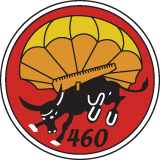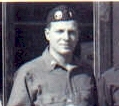
(Information collected and borrowed from a tribute site to Capt. Woodhull from Stevin Oudshoorn, Amsterdam, The Netherlands}
Robert P. Woodhull was from Ohio.
He was an officer Forward Observer with the 460 Field Artillery Battalion. His job was to get as far forward as possible to direct artillery fire on enemy positions.
The 460th was part of the 17th Airborne Division in the United States, but attached to the 517th Parachute Infantry regiment when it was shipped to Europe. Together with the 517th Parachute Infantry regiment and the 596 Engineer Combat Company they made up the 517th Regimental Combat Team.
The unit saw action in Italy, participated in the invasion of southern France and fought in Northeast France and Germany, in the Huertgen forest.
Lt. Howard Hensleigh, HQ Company, 3rd Battalion, 517 PIR, went on many missions with Capt. Woodhull. He writes:
"Woody" Woodhull of the 460th was a buddy. He had been assigned to the 3rd Bn. as our artillery liaison officer for a long time. He and his radio operator, Herbert Jeff, were virtually part of the 3rd battalion. From the jump in Southern France on August 15, 1944, I was the Battalion S-2 responsible for obtaining information about the enemy. We did this mainly by patrolling. Woody and Herb went on almost all of our patrols. Herb and Woody used to covet our combat infantry badges; they deserved them. If we got in too deep and were being pursued by the Germans, Woody would call in artillery to give us time to make it back to our lines. Sometimes we had the assistance of the 460th's L5 (Piper Cub) aircraft to cool things off.We patrolled together many times in southern France. After a successful combat patrol, Woody would call in artillery to finish the job and keep the enemy troops from deciding to follow us as we withdrew."
One encounter is remembered by Lt. Hensleigh when they took some German prisoners:
"Once on a combat patrol in Southern France we had a platoon of Germans partially surrounded. When I yelled at them to surrender and several times the Germans stood up with their hands up, their non com fired his machine gun to thwart the surrender. Woody crawled forward with me to within a few feet of the gun position where we silenced him. I put an M-1 clip into the bush I thought his fire came from. Luckily, I guessed right, because I don't think there would have been a second chance. It is a shame we couldn't have met on different circumstances. He was a brave guy. We might have been friends. We captured the platoon, all their weapons, ammo and equipment. The German officer slipped away when the fighting first started, as they were ordered to do to preserve the officer corps. Most good American combat officers were up front where they knew what was going on. This sometimes resulted in their loss.
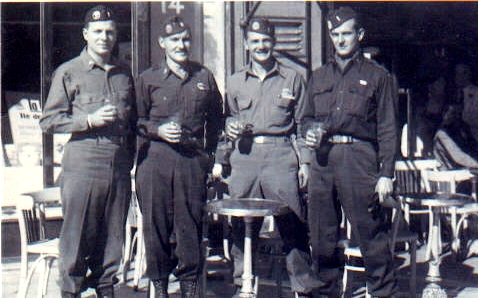 .............. Paris
1944: Left to Right: Lt. Woodhull, Major Paxton, Lt. Alicki and Lt. Dickerson
(picture courtesy of Lt. John Alicki)
.............. Paris
1944: Left to Right: Lt. Woodhull, Major Paxton, Lt. Alicki and Lt. Dickerson
(picture courtesy of Lt. John Alicki)
Early February 1945, the 517 PIR found themselves on the frontline near Bergstein in the Huertgen forest and ready to attack. The area of Schmidt, Vossenach, Bergstein and Kommerscheidt was a heavily fought over area for many months. The initial attack was beaten off by the Germans with incredible casualties to the US forces. The Regiment was to make a divisionary attack, in support of the main assault.
Lt. Hensleigh: "During the next few days, the 517th would encounter some of the most violent fighting of the war, under the severest of weather conditions. During this period in the Bergstein- Schmidt area of the Huertgen Forest, the 460th Fire Direction Center coordinated their heaviest concentration of artillery fire of the war. 14 battalions of division and corps artillery, FO Captain Robert Woodhull was killed while directing fire and FO team member, Battalion Operations Sergeant, Tech Sergeant George Hubbard was seriously wounded.
Now, to that morning. We were new to the terrain around Bergstein having
just arrived there before the attack. The Germans had been there for several
months defending that terrain. They had laid extensive mine fields and had
machine gun, mortar and artillery zeroed in to protect well
organized defensive positions. From the outset, our attacking infantry units
were in serious trouble. When they hit the mine fields, the supporting enemy
fire came in with devastating effect. What Woody and I were attempting to do
was to give G, H and I Companies artillery support in their attacks. We got
too close that morning.
Woodhull was killed by a burst of machine gun fire not more than three feet from me at Bergstein. We were doing our "damnedest" to assist the attack with artillery, probably a little too far forward for an OP, which was usual with Woody. Red Meline and I directed artillery fire to wipe out the machine gun nest after his death. His radio man, I believe a Sgt. Riddle, previously was wounded in the lower leg by a burst of the same gun. That burst went between my legs miraculously not even nicking me. He was standing just behind me and was evacuated. We remained in that position all day serving as a communications link between the rifle companies and higher headquarters.
Bergstein was a heart rending diversionary attack – our last taste of combat and a bad one. A diversionary attack is just that though – an attack to fool the enemy into thinking your main thrust is from one direction, when you really intend to get him from another. If you tell the attacker to put on a good show and not take too many casualties, it probably won't fool the enemy and won't be successful. In an attempt to remove some of the bitterness we feel in our enormous losses at Bergstein, personal as well as organizational, we must credit ourselves with the fact that it was a successful diversionary attack. When that outfit swept in from the right with tanks and artillery, they rolled. They rolled because of what we did in that diversionary attack.
I often wonder how we could have done things differently to save Woody's life. He was a prince of a man. "
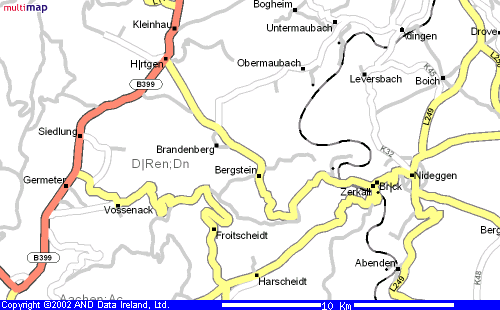
Captain Robert Woodhull is buried at Margraten American Military Cemetery, Plot F Row 8 Grave 1.
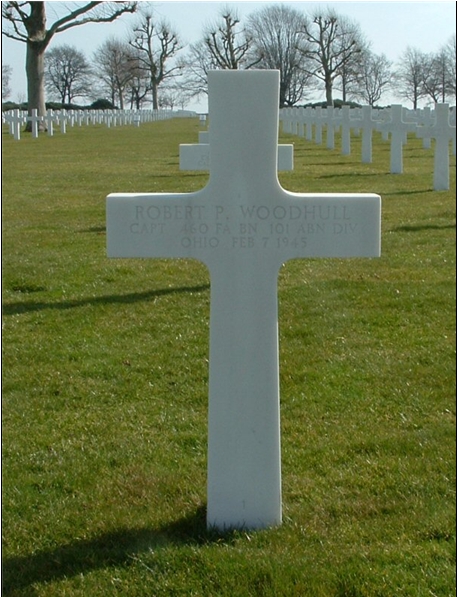
Capt. Woodhull's grave has been adopted by Ronald Stassen:
http://www.band-of-brothers.nl/artikel/enl_men_ronald.htm
More remembrances from Howard Hensleigh:
A mistake was made on Woodie's (Robert Woodhull's) stone;
he was never in the 101st. Woodie and the 460th became part of the
517th Parachute Regimental Combat Team after Tennessee maneuvers in early
1944. This
took place in Camp Mackall, NC. We were never part of the 101st. All
of our fighting in Europe was as a separate Regimental Combat Team. As
5th Army troops we fought in Italy in the Rome Arno campaign, but were
pulled out of 5th Army after a sweep up the Italian "boot" to near the
Po Valley. We were the largest element in the First Airborne Task
Force, under General Frederick, which was formed to invade Southern France
on August 15, 1944, in Operation Dragoon. Although widely scattered
in the night jump, we formed a cover for the seaborne invasion which landed
without opposition due to our efforts. As the ground forces drove
North, The Task Force was assigned the mission of holding the right flank
and driving the axis forces back into Italy. Although there was heavy
fighting for each mountain ridge, we had the pleasant task of liberating
the Riviera and some newsmen called it the "Champaign Campaign". We
completed this mission in early November 1944 ending up in Sospel, France
and then went to northern France by rail in 40 and 8s (box cars with straw
on the floor) for what was to be the "winter offensive" after Christmas. As
you know the Germans beat us to it attacking in what was called the Bulge
on the 16th of December, 1944.
Woodie was promoted from 1st Lt. to Captain in Southern France and was assigned
to the 3rd Battalion 517th Parachute Infantry as artillery liaison officer,
where I was the S-2 (Intelligence). He and his radio man, Herb Jeff,
(who passed away recently) accompanied us on all our patrols which we performed
2 or 3 times a week during the 90 days we were on the lines in S. France. We
worked as a team and Woodie would call in artillery to take care of targets
of opportunity, to slow down enemy forces who were coming after us when we
got too deep into enemy territory, and to destroy targets we spotted after
we made it back inside our own lines. He was a graduate of Princeton
University and we shared many discussions on the War strategy in general as
well as our personal objectives in life. We were all a band of brothers,
but in addition he was a strong personal friend.
After turning the Bulge inside out, the bloodiest combat we faced was in Bergstein,
Germany where we were given a diversionary attack order (an attack in one direction
to fool the enemy when the main attack is coming from another). Woodie
was killed by a burst of machine gun fire in that attack right beside me as
we were directing artillery fire in support of our attacking troops. Question
could be raised as to whether we were too far forward, but that is where we
always were so that we could know what was going on in the attack and support
the troopers who were taking the ground.
I remember him frequently, not just on Memorial Day, and am gratified that
a good resident of the Netherlands (are there any other kind?) has adopted
his grave. Although I find the name Woodhull as one of the fighters in
our Revolution in the Book "1776", Herb Jeff told me that Woodie was the last
of his family line, one of the great losses from WWII.
We express out appreciation from the entire 517th Combat Team for honoring
one of our finest fallen brothers. Howard Hensleigh
